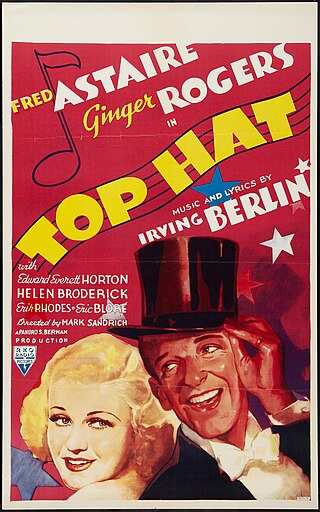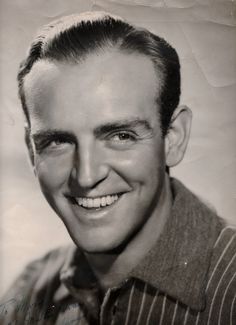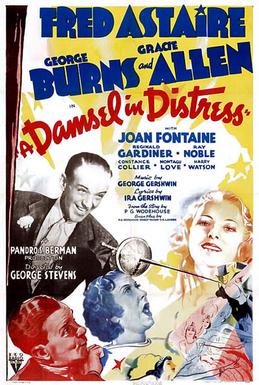
Top Hat is a 1935 American musical screwball comedy film in which Fred Astaire plays an American tap dancer named Jerry Travers, who comes to London to star in a show produced by Horace Hardwick. He meets and attempts to impress Dale Tremont to win her affection. The film also features Eric Blore as Hardwick's valet Bates, Erik Rhodes as Alberto Beddini, a fashion designer and rival for Dale's affections, and Helen Broderick as Hardwick's long-suffering wife Madge.

Ginger Rogers was an American actress, dancer and singer during the Golden Age of Hollywood. She won an Academy Award for Best Actress for her starring role in Kitty Foyle (1940), and performed during the 1930s in RKO's musical films with Fred Astaire. Her career continued on stage, radio and television throughout much of the 20th century.

Fred Astaire was an American dancer, actor, singer, musician, choreographer, and presenter, whose career in stage, film, and television spanned 76 years. He is widely regarded as the "greatest popular-music dancer of all time" and received numerous accolades, including an Honorary Academy Award, three Primetime Emmy Awards, a BAFTA Award, two Golden Globe Awards, and a Grammy Award.

Swing Time is a 1936 American musical comedy film, the sixth of ten starring Fred Astaire and Ginger Rogers. Directed by George Stevens for RKO, it features Helen Broderick, Victor Moore, Betty Furness, Eric Blore and Georges Metaxa, with music by Jerome Kern and lyrics by Dorothy Fields. Set mainly in New York City, the film follows a gambler and dancer, "Lucky" (Astaire), who is trying to raise money to secure his marriage when he meets a dance instructor, Penny (Rogers), and begins dancing with her; the two soon fall in love and are forced to reconcile their feelings.

Blue Skies is a 1946 American musical comedy film directed by Stuart Heisler and starring Bing Crosby, Fred Astaire, and Joan Caulfield. Based on a story by Irving Berlin, the film is about a dancer who loves a showgirl who loves a compulsive nightclub-opener who can't stay committed to anything in life for very long. Produced by Sol C. Siegel, Blue Skies was filmed in Technicolor and released by Paramount Pictures. The music, lyrics, and story were written by Irving Berlin, with most of the songs recycled from earlier works.

John William Sublett, known by his stage name John W. Bubbles, was an American tap dancer, vaudevillian, movie actor, and television performer. He performed in the duo "Buck and Bubbles", who were the first black artists to appear on television in the US. He is known as the father of "rhythm tap."

Hermes Pan was an American dancer and choreographer, principally remembered as Fred Astaire's choreographic collaborator on the famous 1930s movie musicals starring Astaire and Ginger Rogers. He worked on nearly two dozen films and TV shows with Astaire. He won both an Oscar and an Emmy for his dance direction.

A Damsel in Distress is a 1937 American English-themed Hollywood musical comedy film starring Fred Astaire, George Burns, Gracie Allen and Joan Fontaine. Loosely based upon P.G. Wodehouse's 1919 novel of the same name and the 1928 stage play written by Wodehouse and Ian Hay, it has music and lyrics by George and Ira Gershwin. The film was directed by George Stevens, who had also directed Astaire in Swing Time (1936).
Daniel Yankelovich was an American public opinion analyst and social scientist.

Second Chorus is a 1940 Hollywood musical comedy film starring Paulette Goddard and Fred Astaire and featuring Artie Shaw, Burgess Meredith and Charles Butterworth, with music by Artie Shaw, Bernie Hanighen and Hal Borne, and lyrics by Johnny Mercer. The film was directed by H. C. Potter and produced independently for Paramount Pictures by Boris Morros, with associate producers Robert Stillman and (uncredited) Fred Astaire. The film's copyright expired in 1968 and it is now in the public domain.
Warren J. Mitofsky was an American political pollster.
Robert John Wuthnow is an American sociologist who is widely known for his work in the sociology of religion. He is the Gerhard R. Andlinger Professor of Sociology Emeritus at Princeton University, where he is also the former chair of the Department of Sociology and director of the Princeton University Center for the Study of Religion.

Andrew Kohut was an American pollster and nonpartisan news commentator about public affairs topics.
James A. Davis (1929–2016) was a distinguished American sociologist who is best known as a pioneer in the application of quantitative statistical methods to social science research and teaching. Most recently, he was a Senior Lecturer in Sociology at the University of Chicago.
The Roper Center for Public Opinion Research at Cornell University is the world's oldest archive of social science data and the largest specializing in data from public opinion surveys. Its collection includes over 27,000 datasets and more than 855,000 questions with responses in Roper iPoll, adding hundreds more each year. The archive contains responses from millions of individuals on a vast range of topics. The current executive director of the center is Jonathon P. Schuldt, Associate Professor of Communication at Cornell University, with a governing board of directors chaired by Robert Y. Shapiro of Columbia University.
Adam J. Berinsky is a professor of political science at the Massachusetts Institute of Technology. He is the author of the 2004 book Silent Voices: Public Opinion and Political Participation in America and the 2009 book In Time of War: Understanding Public Opinion, From World War II to Iraq.
Eric Schickler is an American political scientist, currently the Jeffrey & Ashley McDermott Endowed Chair at University of California, Berkeley and an Elected Fellow of the American Academy of Arts & Sciences.
Robert J. Blendon is an American academic who is the Richard L. Menschel Professor of Public Health and Professor of Health Policy and Political Analysis, Emeritus and former Director for the Division of Policy Translation and Leadership Development at the Harvard T.H. Chan School of Public Health. He previously held appointments as a Professor of Health Policy and Political Analysis at the Harvard T.H. Chan School of Public Health and the Harvard Kennedy School of Government. He formerly directed the Harvard Opinion Research Program and co-directed the Robert Wood Johnson Foundation/Harvard T.H. Chan School of Public Health project on understanding Americans’ Health Agenda. Previously, he co-directed a polling series with The Washington Post and Kaiser Family Foundation.
Norman M. Bradburn is an American social scientist and the Tiffany and Margaret Blake Distinguished Service Professor Emeritus at University of Chicago and former University Provost, and an Elected Fellow of the American Academy of Political and Social Science, American Statistical Association, and American Academy of Arts and Sciences.
James Allen Stimson is an American political scientist and the Raymond Dawson Distinguished Bicentennial Professor of Political Science Emeritus at the University of North Carolina at Chapel Hill. After teaching at the University at Buffalo and Florida State University, among other institutions, he joined the faculty of the University of North Carolina at Chapel Hill in 1997, remaining there until his retirement in 2018. A fellow of the American Academy of Arts and Sciences, he served as a fellow of the Center for Advanced Study in the Behavioral Sciences from 1994 to 1995 and as a Guggenheim Fellow from 2006 to 2007. He has received the Eulau and Kammerer Awards from the American Political Science Association, as well as the Chastain Award from the Southern Political Science Association. In 2016, he received the Warren J. Mitofsky Award for Excellence in Public Opinion Research from the Board of Directors of the Roper Center for Public Opinion Research.










